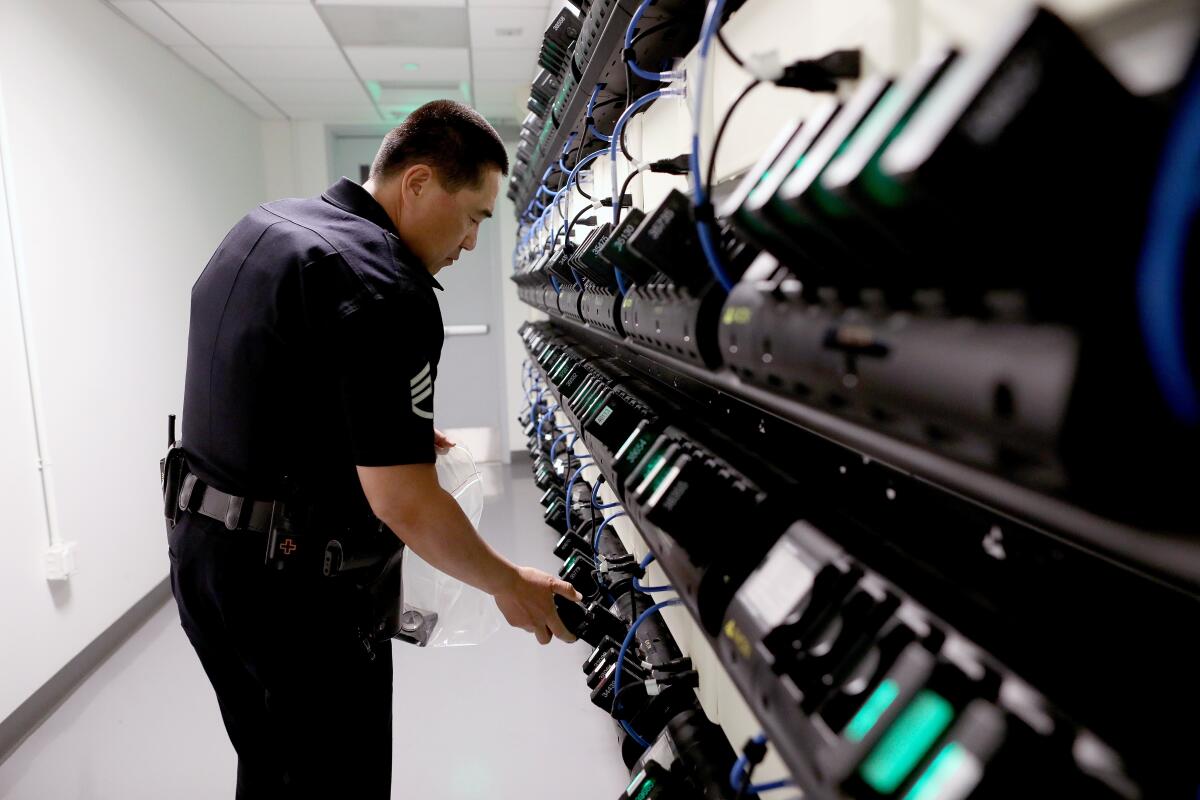LAPD will inspect random body-worn camera videos for training lapses, biased policing

With body-worn cameras recording 14,000 interactions each day, the Los Angeles Police Department will soon start reviewing random recordings to make sure officers are following guidelines when dealing with the public.
Chief Michel Moore told the Board of Police Commissioners on Tuesday that he reached an agreement with the Los Angeles Police Protective League, the union that represents rank-and-file cops, to inspect recordings that don’t involve arrests or the use of force.
The inspections will allow supervisors to determine whether some officers need additional training or counseling to prevent instances of biased policing, Moore said. Supervisors will make sure officers aren’t rude and that they explain their actions when stopping people, he said.
He said he expects the “vast majority” of the inspections will show officers “acting consistent with our expectations.” He also wants to make sure officers use proper tactics in encounters.
“We can improve the public’s trust,” Moore said Wednesday. “It’s an opportunity to make sure people are being treated fairly.”
Police Commissioner Shane Murphy Goldsmith said she is “glad to see the LAPD acknowledging that biased policing is a problem and taking a comprehensive approach to solving it.”
The chief’s plan to inspect “video footage to identify trends, develop training and hold officers accountable to the highest standard of fair and unbiased policing is a big step forward,” Goldsmith said.
Many complaints of biased policing stem from arguments between officers and motorists during traffic stops and when people refuse to answer an officer’s questions, Moore said. The inspections will help lead to training that could help de-escalate those situations, he added.
Currently, police bosses review recordings from arrests, when force is used or in cases where the public files complaints against officers.
Tom Saggau, a spokesman for the police union, called the inspections “a really good thing” and a way to provide additional training to improve the department. The union’s board of directors is expected to formally approve the agreement at its next meeting.
“We support this,” Saggau said.
Even prior to the new agreement, police leaders could review recordings and discipline officers for misconduct discovered on video, Saggau said, adding: “If they identify misconduct, then the chips will fall how they fall.”
Moore said last month the new inspections would be used for training purposes, not “gotcha” moments for officers.
The use of body-worn cameras by police has expanded across the country. While the cameras cost millions to purchase and maintain, citizens and many police leaders say cameras provide transparency in the wake of high-profile incidents.
The LAPD began field testing body-worn cameras in 2014 and eventually deployed more than 7,000. The department collects about 14,000 recordings each day and has accumulated recordings totaling 2.1 million hours.
Last month, The Times reported the body-worn camera recordings helped determine officers committed infractions in 56 cases in 2018. But police leaders found 264 other complaints against officers “demonstrably false” or resulted in complete exoneration, according to an annual report presented to police commissioners. Both of those figures rose significantly from five and 79, respectively, the prior year.
The false complaints waste resources and harm officers’ careers, the union’s board of directors said last month. The public, the union said, needs to be held accountable for filing false claims.
More to Read
Sign up for Essential California
The most important California stories and recommendations in your inbox every morning.
You may occasionally receive promotional content from the Los Angeles Times.











